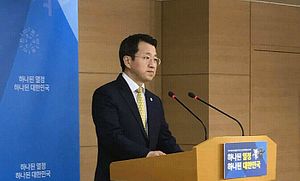As The Diplomat has been closely following, both Koreas have been moving fast toward an unexpected rapprochement since North Korean Supreme Leader Kim Jong-un offered a rare olive branch in his New Year’s speech.
On January 9, the two Koreas made a substantial breakthrough by holding the first face-to-face official talks in more than two years.
According to the South Korean joint press corps, both sides sent a five-member delegation to the meeting in Panmunjom village in the demilitarized zone (DMZ). Before the meeting started, North Korea’s chief delegate Ri Son-gwon, chairman of the North’s Committee for the Peaceful Reunification of the Fatherland, said in front of the cameras, “I came here with hopes that the two Koreas hold talks with a sincere and faithful attitude to give precious results to the Korean people who harbor high expectations for this meeting, as the first new year present.”
Ri’s counterpart, Cho Myoung-gyon, the head of the South’s Unification Ministry, replied, “Well begun is half done. I hope that [the two sides] could hold the talks with determination and persistence.”
During the meeting, the North offered to send a delegation to the upcoming PyeongChang Olympics including high-ranking officials, athletes, cheering and performing art squads, taekwondo demonstration teams. and journalists. The South proposed that both sides march together during the opening and closing ceremonies and that the North dispatch a cheering squad for the event, the South’s Vice Unification Minister Chun Hae-sung told the reporters later after the meeting.
As The Diplomat noted earlier, at the 2000 Sydney Summer Olympics, the 2002 Busan Asian Games, and the 2004 Athens Summer Olympics, athletes from North and South Korea all marched together in the opening ceremony under the Unification Flag of Korea. The symbolic unification during these sports games had marked previous high points in inter-Korea relations.
Besides discussion on the PyeongChang Olympics, both sides also negotiated multiple ways to improve ties.
Chun revealed later that the South also offered to hold a Red Cross meeting to discuss family reunions and military talks to prevent accidental conflict along the border.
“We also raised the need to end acts that can escalate tensions on the Korean Peninsula and to resume dialogue to bring peace to the Korean Peninsula, such as [North Korea’s] denuclearization,” Chun said.
Notably, ahead of the talks between the two Koreas, both China and Japan had sent top envoys on the North Korean issue to Seoul.
On January 5, China’s Special Representative of the Chinese Government for Korean Peninsula Affairs Kong Xuanyou met respectively with South Korea’s First Vice Foreign Minister Lim Sung-nam and chief representative for Six-Party Talks Lee Do-hoon, according to the Chinese foreign ministry.
On January 8, Kenji Kanasugi, Japan’s chief negotiator for the Six-Party Talks also arrived in Seoul and met with his counterpart. Both sides discussed measures to bring North Korea to the negotiation table.

































